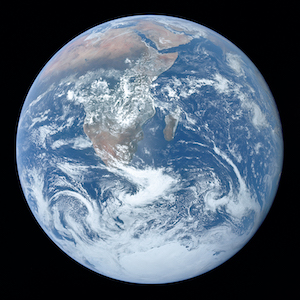 Full disk view of the Earth taken on December 7, 1972, by the crew of the Apollo 17 spacecraft en route to the Moon at a distance of about 29,000 kilometres (18,000 mi). It shows Africa, Antarctica, and the Arabian Peninsula. Public domain.As the IPCC’s latest report makes clear, averting the worst effects of climate change demands a profound economic transformation in the next decade. Achieving it will require a new social contract, based on a fairer distribution of wealth and income.
Full disk view of the Earth taken on December 7, 1972, by the crew of the Apollo 17 spacecraft en route to the Moon at a distance of about 29,000 kilometres (18,000 mi). It shows Africa, Antarctica, and the Arabian Peninsula. Public domain.As the IPCC’s latest report makes clear, averting the worst effects of climate change demands a profound economic transformation in the next decade. Achieving it will require a new social contract, based on a fairer distribution of wealth and income.
Owen Gaffney -- Project Syndicate
March 31, 2023
STOCKHOLM – The Intergovernmental Panel on Climate Change has issued a final warning to humanity: unless we halve greenhouse-gas (GHG) emissions by 2030, we will have no chance of capping global temperatures at 1.5° Celsius above pre-industrial levels.
Achieving that target will be extremely challenging, but it is both possible and affordable – if we ensure that the world’s wealthiest pay their fair share.
Inequality has skyrocketed in recent years. During the pandemic, as more than 160 million people were pushed into poverty, the world’s ten richest people doubled their fortunes. The wealthiest 10 percent of the global population now rake in 52 percent of global income and hold 77 percent of global wealth, while the poorest 50 percent claim just 8 percent and 2 percent, respectively.
The gap continues to widen. Billions of people are suffering from rising living costs and stagnant wages, and with recession looming, prospects for achieving greater prosperity appear bleak. The world has never been so wealthy, yet most people endure chronic economic insecurity. This is a recipe for deeply polarized, dysfunctional societies, democratic decay, and a dangerously unstable world.
Economic inequality is reflected in climate inequality. As the IPCC notes, the 10 percent of households with the highest per capita emissions – that is, the wealthiest households globally – contribute up to 45 percent of consumption-based household GHG emissions. The bottom 50 percent – four billion people, many of whom face severe energy insecurity – contribute just 13-15 percent.
(more)
READ MORE:: Project Syndicate





